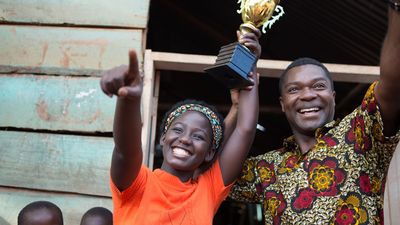In Conversation: Abiola Oke With David Oyelowo Part 3
Award winning actor David Oyelowo dialogues with OkayAfrica CEO Abiola Oke. This is part 3 of 3.
This is the third and final of our discussion with David Oyelowo. Read part 1 of the conversation here.Read part 2 here.
David Oyelowo is currently one of Hollywood's most sought-after leading men, and an “Officer of the Order of the British Empire" whose background in theater gives his acting a depth that outpaces all but a few of his contemporaries. We loved him last year as Phiona Mutesi's big-hearted chess coach in Queen of Katwe and for his career-defining role in Ava Duvernay's 2014 film "Selma" for which he won a Golden Globe and an NAACP Image Award.
In this dialogue, he connects with our CEO and Publisher Abiola Oke, speaking candidly about film, family and being a proud Nigerian. Part 1 focussed on his scholarship with GEANCO for girls affected by conflict in northern Nigeria. Part 2 gets to the heart of what it means to be black, British and Nigerian in Hollywood. Part 3, below, takes on directing and what it would take to get a Fela biopic off the ground.
OkayAfrica: Will we see you in the director's chair at some point in the future? And also, what advice would you give to upcoming or current actors who want to transition into producing, currently?
David Oyelowo: Directing is something I would love to do eventually. I directed a fair bit of theater in the U.K. before we moved to the States, and I actually directed a short film called "Big Guy" a few years ago. I just wanted to test my hand at it. And you know, like you said earlier, it is tricky for sure, balancing those hats. There are definitely times on a set where I would rather be left as an actor and not be thinking about the producerial stuff.
You know, I'd just really take my hat off to guys like Mel Gibson and Kenneth Branagh who have directed films they've played the leads in. I mean, that is just sort of like, an insurmountable amount of work. But it's something I desire to do, and with each film I do I learn more about how to put a film together, so yes, that is an ambition of mine.
And my advice is basically, as I've already said, don't wait for anyone. You don't have to anymore. I mean, ten years ago equipment was more expensive and harder to come by, and you know, it's just so readily available now. So you know, if it's a passion of yours, really, in this day and age, you have no excuse to not be doing the thing you claim to be passionate about.
OKA: So with OkayAfrica and our sister companies, we do manage the master rights to the Fela catalog, and I'm curious to know if—and we're producing Finding Fela and a couple of other projects—would you ever be interested in playing Fela Kuti?
DO: Oh gosh.
OKA: You didn't expect that one.
DO: That's a good question. I have been approached a few times to play Fela, and you know he is someone who I admire hugely, certainly especially from his revolutionary music and also just his standing, culturally, within Nigeria's history. You know, the tricky thing with doing a story about Fela is that you cannot afford to make the film purely because you're a fan. You have to find the story that enables the entire globe to discover him anew. And he is a character who is worthy of that, but some of the iterations that have come across my desk have clearly been written by or have been created by people who are fans and so therefore there is a degree of myopia that doesn't enable it to sort of open up.
You know, when you watch Raging Bull, you don't even have to be a boxing fan or know who Jake Lamotta is in order for you to come away from that film going, "Whoa. That was an intense film about two brothers and a relationship between a very complicated man and his wife." And so it's trying to find the universal in the specific of who Fela is that I think would then warrant a film, or—I shouldn't say warrant, because it is warranted—I should say, that's what would enable a film worthy of Fela. Something that truly opens up the complexity of who this man was, not just to fans or to Nigerians or even Africans, but for the world.
I don't know, maybe perhaps we might add some scriptwriting to some of your credits sometime soon.
Well, you know, I have four kids, a lovely wife, and three dogs. There's only so many hours in the day I can work in a week, but I'm trying, Abiola, I'm trying. You're putting my feet to the fire here, I can tell I've got to step it up.
This is the end of Part 2. Part 1 of the conversation can be read here and part 3 will go live in the following weeks.
- David Oyelowo Debuts Directorial Film 'The Water Man' on Netflix - OkayAfrica ›
- David Oyelowo Debuts Directorial Film 'The Water Man' on Netflix - OkayAfrica ›
- David Oyelowo Debuts Directorial Film 'The Water Man' on Netflix - OkayAfrica ›
- David Oyelowo on Fatherhood, Family and Finding Balance in 'Silo' - OkayAfrica ›
